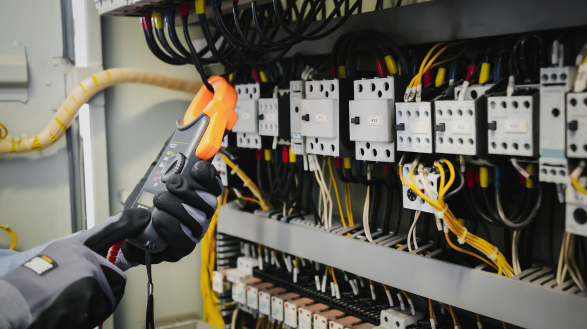Fixed wire testing, also referred to as the ‘Electrical Installation Condition Report, is a method by which an electrical installation’s main electrical wiring system can be inspected and assessed to ensure it is safe to use and complies with BS 7671:2008 (2011) regulation (previously the 16th Edition Wiring Regulations).
The Electricity at Work Regulations 1989 requires those who are in control of an electrical system, or part of an electrical system, to ensure it is regularly maintained and safe to use. It is a legal requirement to commission the installation of any new electrical systems and major modifications before they are put into operation.
Electrical dangers can be the cause of serious injuries, even death. Under the Health and Safety at Work Act 1974, it is also an employer’s duty to ensure the health, safety and welfare of all employees. This includes ensuring all electrical equipment and installations are safe to use.
What does an electrical test involve?
Fixed wire testing consists of inspecting and testing electrical installations and circuits to ensure they are safe to use. Electrical installation regulations require that all electrical installations must meet the wiring regulations laid out by the Institution of Engineering and Technology (IET) and British Standard BS 7671.
During the fixed wire testing process, the test will include a visual inspection, as well as a physical test using specially designed testing equipment. This test checks all low-voltage electrical systems in a building, including main panels, distribution boards, lights and plug sockets, looking for overloads, defects and hazards that may cause harm or present a risk to life.
The results of the test are presented back to the person responsible or often referred to as “the duty holder” in the form of an Electrical Installation Condition Report (EICR).
How do I prepare for an electrical inspection?
Prior to the electrical inspection, you need to make sure that all devices are switched off. Also, any sensitive devices should be unplugged, as there is a chance they can be affected by the testing.
Please remember the person who is undertaking the fixed wire testing will not know what devices you have so it is your responsibility to disconnect these. Moreover, you need to clear the surrounding area as much as possible to allow the assigned person to have easy access to the plugs.
How often do I need to do a fixed wire testing inspection?
Electrical checks are recommended to be conducted annually to ensure compliance with The Electrical Work Regulations 1989. However, electrical installations require testing in accordance with BS7671. The assigned duty holder is responsible within an organisation to organise for these works to be undertaken.
Most electrical installations require testing every one to five years, depending on the type of electrical installation, how often it is used and the environment it sits in.
Most offices, schools or care homes do not require electrical wire testing as often as a high-risk environment such as a swimming pool or an industrial unit. A swimming pool is exposed to high levels of moisture and industrial units usually present high dust levels, which would require more frequent testing to ensure safety – every one to three years, depending on the risk levels.
At Compliance Group we are fully NICEIC registered which ensures that you can meet these requirements whilst complying with the current regulations, as well as rectifying any faults highlighted in the report. Our extensive testing experience and knowledge also allow us to competently carry out remedial works following test reports provided by other companies. To book your five-year fixed wire test or for further information on the latest electrical safety legislation, please contact our expert team today at info@compliancegroup.uk.
A nationwide
network of intelligent
compliance services.


